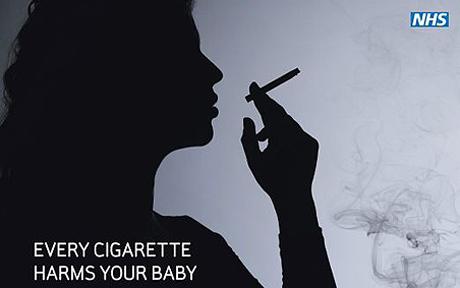Calls for work in North East to cut smoking in pregnancy to be rolled out nationwide.

Work in the North East to cut smoking in pregnancy by nearly 1/3 has been hailed as an example for the rest of England to follow by a coalition of national health and baby charities.
Francine Bates, Chief Executive of the Lullaby Trust and Professor Linda Bauld who are Co-Chairs of the Smoking in Pregnancy Challenge Group, along with ASH which co-ordinates the group, praised the rapid fall in North East maternal smoking rates after a four year initiative to help midwives raise smoking as a crucial issue affecting unborn babies’ health.
Every woman in the North East is now routinely given carbon monoxide monitoring when they first see a midwife – and those with high readings referred to a stop smoking service, following the NICE guidance[i]. For those women still smoking at 12 weeks, a midwife leads a detailed discussion highlighting the potential harm to the unborn child – resulting in rates falling from 22.2% of women smoking at the time they gave birth in 2009-10 down to 15.6% in 2016.
Fresh – the North East’s tobacco control office funded by all 12 local authorities – has overseen the rollout of the “babyClear” approach[ii] which works in two ways:
•Women receive carbon monoxide (CO) monitoring as part of the routine tests during their booking appointment at around 8 weeks into the pregnancy. All high CO readings are routinely referred to Stop Smoking Services within 24 hours where they can get help to quit.
•Women still smoking at their 12 week dating scan are talked through a more hard hitting and factual discussion on the harms of smoking with their midwife, using software to show the potential harm being done when an unborn baby is exposed to smoke.
The Smoking in Pregnancy Challenge Group, including ASH, the Royal College of Midwives, Tommy’s and the Lullaby Trust, published a report[iii] in 2013 calling for more action to fully embed the NICE (National Institute for Health and Care Excellence) guidance around smoking in pregnancy and renewed the call for action in a review of progress in 2015.[iv] The Group recommends midwives raise smoking as an issue, use carbon monoxide monitoring to check high levels of exposure to tobacco smoke; and refer all smokers to local stop smoking services.
Deborah Arnott, chief executive of health charity ASH, which co-ordinates the Challenge Group, said: “The North East has made great strides in reducing smoking in pregnancy by a combination of hard work and a well thought out, evidence-based approach. If the government is to meet its commitment to reduce the rate of stillbirths, neonatal and maternal deaths in England by 50% by 2030 all of England needs to follow their lead.”
Francine Bates, Chief Executive of The Lullaby Trust and Co-Chair of the Challenge Group said:”The North East region is to be hugely congratulated for the work they are doing to support women to stop smoking in pregnancy.
“Maternal smoking is now the single biggest modifiable factor for sudden infant deaths. This programme will undoubtedly have saved many babies’ lives and greatly improved health outcomes for families previously exposed to second-hand smoke. I hope that other parts of the country will take note and implement a similar systematic approach.”
Professor Linda Bauld, Co-Chair of the Smoking in Pregnancy Challenge Group and Professor of Health Policy at the University of Stirling said: “The North East of England has taken a lead in implementing evidence-based recommendations from NICE and the Smoking in Pregnancy Challenge group.
“The progress that has been achieved is impressive and provides a valuable example for other parts of the country. These changes have undoubtedly saved lives – not just for babies and infants but also for mothers, as pregnancy provides a unique opportunity for women to stop smoking and stay stopped over the longer term.
“The region have also evaluated their approach through independent research and I look forward to the publication of those results, which will provide invaluable evidence for us to continue to make the case for action that contributes to continued declines in smoking in pregnancy in the future.”
Ailsa Rutter, Director of Fresh, said:”Most women who smoke will have started in their teens or younger, and we recognise it is an addiction that is not always easy to quit. Women need the facts but also to know there is excellent free support to quit smoking where they will be supported and helped, not have the finger wagged at them.
“Some women can find the facts quite shocking – but most are very glad they have been told and come to expect this as part of their ante-natal care.”
Peter Kelly, North East Public Health England Centre Director, said: “Supporting women in having a healthy pregnancy is essential for their health and their unborn child. Stopping smoking is a critical element of a healthy pregnancy and it is very encouraging to see such progress in the North East.”
Following babyClear’s launch in 2012, around 450 midwifery staff and 150 Stop Smoking Service advisers have received skills training to discuss the issues with women in a factual, blame-free way, as well as being provided with equipment to deliver interventions.
When a smoker inhales, the 5000 chemicals in smoke, such as arsenic, benzene and formaldehyde, are absorbed through the lungs and move into the bloodstream. In pregnant women, these chemicals are passed to the unborn baby, depriving them of vital oxygen. Exposure to CO may cause harm to an unborn child, including low birth weight, perinatal death (stillborn and deaths within the first four weeks of birth), and behavioural problems.
A report by the Royal College of Physicians published in 2010 (Passive smoking and children) found maternal smoking causes up to 5,000 miscarriages, 300 perinatal deaths (stillbirths and sudden infant deaths within the first four weeks of birth) and 2,200 premature births a year nationwide. In the North East that breaks down to 360 miscarriages, 22 perinatal deaths (stillbirths and sudden infant deaths with the first four weeks of birth) and 160 premature births.
Research with midwives by NHS North East and Newcastle University in 2010 found not all midwives felt confident or equipped to raise smoking during pregnancy, with many wanting more training and resources such as CO monitors. Feedback from wards has also found women come to expect smoking being raised as an issue, and does not affect the positive relationship they have with their midwife.
Figures published in August 2016 revealed the North East has also seen the biggest fall in overall adult smoking rates in England since 2005, from around 29% of people smoking down to 18.7% in 2015.
